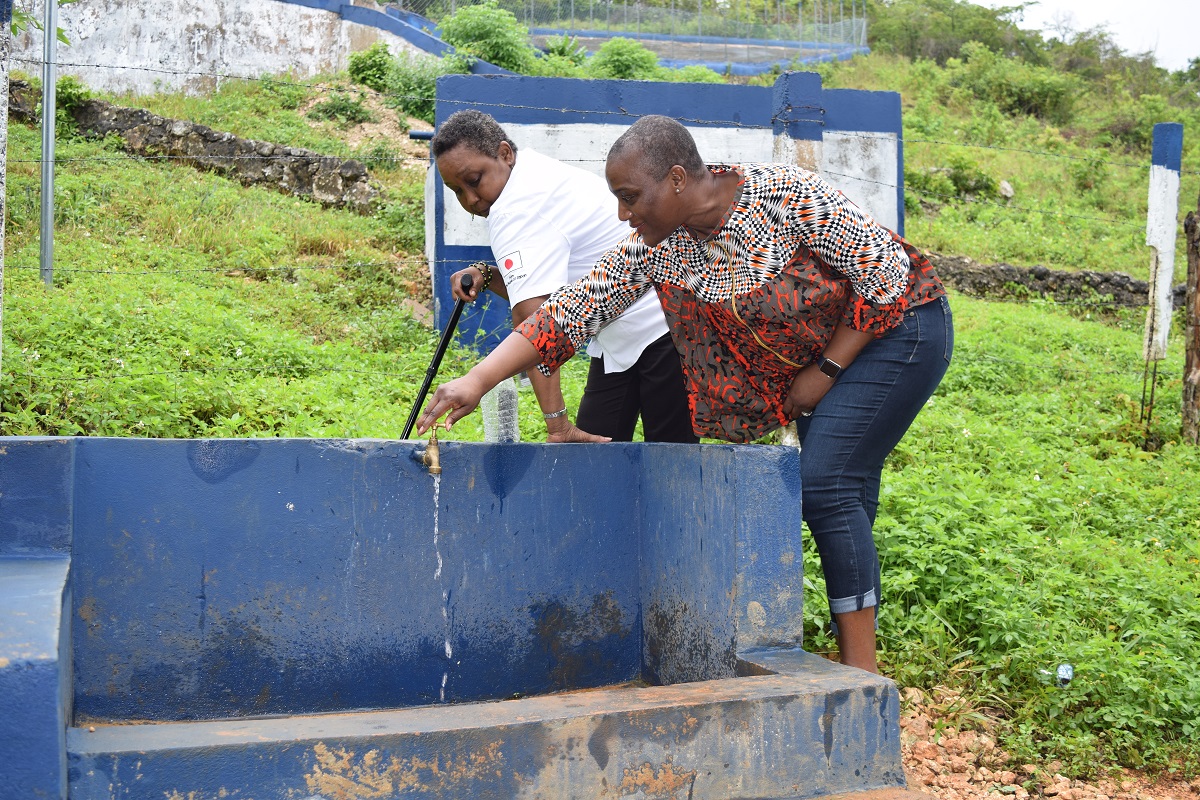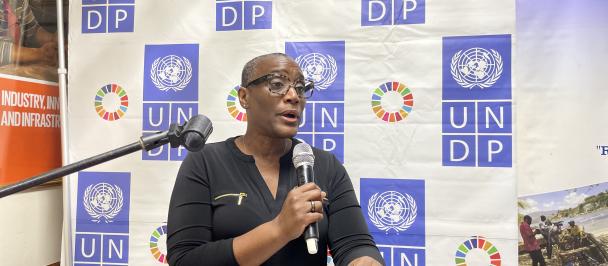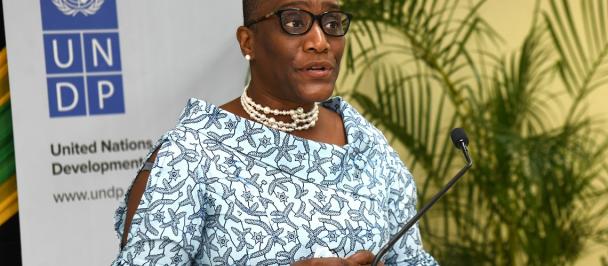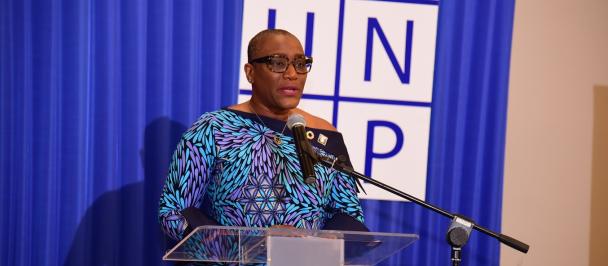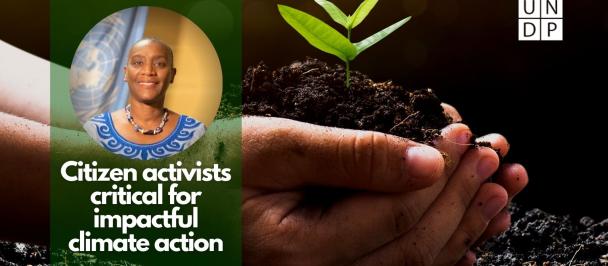Denise E Antonio, UNDP Resident Representative on a field trip to communities in Clarendon and St Ann that had benefited from water harvesting equipment and infrastructure under the Japan Caribbean Climate Change Partnership implemented by UNDP.. Here she is accompanied by then JCCCP National Coordinator Eltha Brown.
UNDP’s observations from 20 years of support to Jamaica’s Climate Change Adaptation and Mitigation Agenda
Originally published in The Gleaner
By Denise E Antonio, UNDP Resident Representative
Kingston 7 August 2020 – A global 19th century tradition of packing stones into wire baskets, then stacking these baskets into unsteady hillsides has been routinely proven to stabilize landslide-prone areas, saving lives, livelihoods and housing stock right here in 21st century Jamaica. The gabion wall or basket as it is called, is symbolic of how actions to bolster climate change adaptation and mitigation is most powerful when members of the community are involved and tried and proven traditional knowledge is employed.
The United Nations Development Programme (UNDP) Multi Country Office in Jamaica, through its Small Grants Programme has effectively deployed the gabion wall technique in several communities in Jamaica and imparted valuable gabion wall-making skills that can be called on when necessary to further bolster the community’s resilience to the impacts of climate change. Wordsworth Gordon of Jeffrey Town Farmers Association in St Mary told us of a day when gabion walls installed in the community saved several houses from certain destruction following heavy rains. These and similar strategies at the community levels offer plenty options for strengthening community resilience as Jamaica faces increasingly frequent and powerful storms and hurricanes with potentially devasting impact. Jamaica’s vulnerability to hurricanes is underscored by a United Nations Conference on Trade and Development case study which described Jamaica as being located in the “hurricane alley” of the Atlantic, featuring large population concentrations and infrastructure located in narrow coastal areas; and high dependency on natural resources. A 2012 Socio-economic and Environmental Disaster Impact Assessment concluded that between 2001 and 2010, Jamaica had been impacted by 10 disaster events, resulting in $111.81 billion in losses, and a new World Bank Report, ‘Advancing Disaster Risk Finance in Jamaica’ is suggesting that, on average, Jamaica would need $16 billion annually to cover losses from natural disasters. Of this amount, it is estimated that $9 billion would be required to address hurricane damage to public and private buildings.
Significant socio-economic and environmental challenges caused by Climate Change.
UNDP’S climate action Portfolio in Jamaica has largely been shaped by these facts and other data pointing to other significant socio-economic and environmental challenges caused by Climate Change. Severe Climate Change impacts on rural communities, such as drought, has curtailed access to potable water, impacting food production, income and poverty. Jamaica's Social and Economic Survey 2018 indicates that average annual rainfall in Jamaica is below the 30-year mean for most parishes, with 20 more incidents of normal drought and eight more incidences of severe drought than the previous year (). Coral reef health – needed to reinforce coastal defence, support livelihoods, seafood supplies and beach regeneration can be threatened by rising sea temperatures, impacting seafood supplies to local markets.
20 years of support to Climate Action
UNDP has long recognized that the natural assets of the earth will sustain our livelihoods, food security and wider development ambitions for generations to come, if we treat them with respect, recognizing their value and their inherent vulnerabilities. Over a period of 20 years, UNDP has been honoured to support a range of Climate Change adaptation and mitigation measures in Jamaica implemented in partnership with the Ministry of Economic Growth and Job Creation and its Climate Change Division, and the National Environment and Planning Agency (NEPA), as well as community groups and individuals across the span of Jamaica.
These measures have had multiple benefits, salient of which is enhancing the country’s resilience to the impacts of climate change and natural disasters. The measures have also helped to integrate climate change imperatives into development planning at the national, local and community levels. Jamaica is a signatory to the United Nations Framework Convention on Climate Change (UNFCCC) and the Paris Agreement. As such, UNDP’s support for Jamaica’s international reporting commitments under relevant conventions, for example, plays a crucial role in assessing Jamaica’s progress in implementing interventions to reduce the impacts of climate change. In partnership with NEPA, UNDP has also supported Jamaica’s policy and programme activities under the Montreal Protocol and the Kigali Amendment which targets the reduction and elimination of ozone harming substances.
UNDP works at two levels to support the advancement of Jamaica’s climate change agenda. We provide technical expertise and guidance in mainstreaming climate change at the policy level, but we also work at the community level where upstream policies are translated into downstream actions. We work with community-based organizations and others on the frontline of the most devastating impacts of Climate Change to enhance community resilience, in order to improve the quality of people’s lives.
UNDP’s policy work to advance the Government’s Climate Action agenda has been very gratifying, especially as it relates to our landmark support to the establishment of the Climate Change Division. But it’s our work with communities, that has given us a front row seat to the significant impacts to be achieved when we work in partnership with the people.
At the community levels, UNDP’s mix of projects focuses on building national resilience to Climate Change risks and other potential crises, consistent with sustainable development priorities and promoting other nature-based solutions which empower people to earn from nature without harm to the environment.
Layers of resilience
We have observed, for example, that expanding access to potable water helps to provide another layer of resilience to disaster prone countries like Jamaica. Partnering with communities across Jamaica and with funding from the People of Japan, Australian Aid and through our Small Grants programme, UNDP has been able to expand water storage capacity by a combined 2.2 million gallons over the last seven years. This addition to Jamaica’s storage capacity, while modest by comparison, is notably still serving 135 000 people in 128 communities across Jamaica. With these investments making additional water available, communities have been able to improve standards of living and livelihoods, strengthen food security, and bolster resilience to disease, drought and other Climate Change impacts.
Clean energy, a win-win for environment and end user, is another area of significant investment for UNDP in Jamaica as we assist the country in meeting its climate change mitigation targets. Utilising UNDP’s core funds, along with resources from the Global Environmental Facility and UNDP’s Small Grants Programme, UNDP has expanded Renewable Energy activities at the community levels in Jamaica, by installing solar systems, training of hundreds in basic LED technology, Solar technology and LED Assembly and Design. With support from the Global Environment Facility, UNDP is currently supporting government in outfitting six public hospitals with renewable energy and energy efficient technology to reduce energy bills.
Our work has taught us a few lessons: That people invested in sustainable livelihoods can become your most avid champions in mitigation and adaptation interventions. Empowered people are sometimes your best lines of defence against the impacts of Climate Change. Partnerships matter, but more than that having a voice and a say makes a bigger difference and shapes more purposeful and impactful interventions. Our community investments are comparatively small, but they demand sweat equity from the communities which helps achieve huge buy in and score major results. Lesson? Big results do not necessarily need big financial investments. Small Grants can and do invariably pack a bigger punch if well executed and managed.
UNDP lauds the stellar climate change adaptation and mitigation efforts of the Government and communities which are steadily bolstering the country’s resilience. While we celebrate Jamaica’s achievements in Climate Action, we acknowledge that there is much work to be done. UNDP commits to continuing its partnership with Jamaica in support of upstream activities in policy advice, developing the country’s technical and financial capacity to improve social, economic and environmental resilience, and supporting Jamaica’s efforts to continue meeting its international climate action-related obligations. We also intend to deepen and expand our engagement with communities on the frontline of Climate Change, confident that our most powerful lessons and moments are with the people. UNDP remains committed to staying with Jamaica on this journey.

 Locations
Locations
